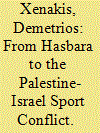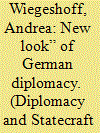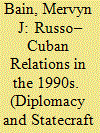|
|
|
Sort Order |
|
|
|
Items / Page
|
|
|
|
|
|
|
| Srl | Item |
| 1 |
ID:
160231


|
|
|
|
|
| Summary/Abstract |
From 2004 to 2007, the Anglo–American alliance was at the heart of counter-narcotics policy-making in Afghanistan. Despite agreement on the broader direction of strategy, one issue generated significant diplomatic conflict: aerial eradication. The debate over its introduction was extremely controversial within both the Anglo–American alliance and the wider George W. Bush Administration, pitting the State Department and its Bureau of International Narcotics and Law Enforcement Affairs against the Pentagon and the British Foreign and Commonwealth Office. Both the Pentagon and British bitterly opposed its introduction fearing it would alienate the rural community and ultimately damage the coalition’s hearts and minds campaign. This analysis provides unique coverage of the fraught policy-making process, paying particular attention to how the British opposed aerial eradication, which included conspiring with the Pentagon in an attempt to defeat the policy. This area of the debate is particularly under-researched, yet is significant as Britain was, after all, the G8 lead nation on counter-narcotics.
|
|
|
|
|
|
|
|
|
|
|
|
|
|
|
|
| 2 |
ID:
160232


|
|
|
|
|
| Summary/Abstract |
Contrary to the conventional wisdom in the literature on United States foreign policy, there was no consensus within the George W. Bush Administration on the parallel between the reconstruction of Iraq and that of post-Second World War Germany and Japan. Systematic analysis of available sources shows that the decision-makers drew a large number of different historical analogies—73 in all. This analysis takes a fresh look at the use of analogies regarding Iraqi reconstruction. We divide the period of April 2003 to June 2008 into four phases, in each of which a different analogy predominates—Afghanistan, Germany and Japan, the Cold War, and Vietnam. Analysis of the analogies embraced by five distinct groups within the Administration’s decision-making team—nationalist hawks, neoconservatives, administrators of Iraq, realist internationalists and the president—clarifies the affinities and tensions amongst them.
|
|
|
|
|
|
|
|
|
|
|
|
|
|
|
|
| 3 |
ID:
160227


|
|
|
|
|
| Summary/Abstract |
This analysis probes the interwoven careers and lives of two distinguished American diplomats, John Paton Davies, Jr. and George Frost Kennan. These Foreign Service officers, who rose to prominence in the years immediately after the Second World War, were embroiled in the formulation and implementation of controversial policy during the early Cold War. The experience of Davies and Kennan illustrates the domestic hazards that have dogged American foreign policy-making even into the present. Yet the focus here is on their friendship—a subject hitherto little examined in the scholarly literature—its connexion to the evolution of their policy recommendations, its steadying power in moments of moral and personal crisis, its tempering effect on failure. The assessment also draws on a notable work of fiction, Wallace Stegner’s 1987 Crossing to Safety, to consider the ineffable nature of friendship itself.
|
|
|
|
|
|
|
|
|
|
|
|
|
|
|
|
| 4 |
ID:
160233


|
|
|
|
|
| Summary/Abstract |
This analysis highlights the role of sport—particularly football—in nation-building. Using netnographic techniques, it focuses on the Palestinian struggle for self-determination and nationhood through the efforts of the Palestinian Football Association [PFA] to challenge Israeli hegemony and function independently of Israeli surveillance in a sovereign Palestinian nation-state. It explains how the PFA has attempted to harness its status, manifested in its Fédération Internationale de Football Association [FIFA] membership, to threaten Israel’s own FIFA membership and its international image. The value of this analysis stems from the way it embeds the empirical narrative within a broader international relations analytical/theoretical framework that problematises the central concept of “soft power” that has predominated the current “sports and international relations” literature.
|
|
|
|
|
|
|
|
|
|
|
|
|
|
|
|
| 5 |
ID:
160223


|
|
|
|
|
| Summary/Abstract |
In 1877, employing the unwanted presence of armed Sioux in western Canada as a useful mechanism, Canada’s Cabinet, represented by Minister of the Interior David Mills, unhappy with perceived British indifference to Canada’s concerns, sought to initiate direct diplomatic relations with the United States. That effort failed, and British opposition to this endeavour was so sharp that Canada made no similar initiative for half a century. Although he failed, Mills’ effort marked the birth of the Functional notion that Canada’s voice should matter more in Imperial foreign policy formulation when its direct interests were at stake, especially when dealing with the United States.
|
|
|
|
|
|
|
|
|
|
|
|
|
|
|
|
| 6 |
ID:
160225


|
|
|
|
|
| Summary/Abstract |
Studies of Chinese involvement in Allied relations during the Second World War tend to focus on the Cairo Conference of November 1943 and see it as the high point for China’s wartime diplomacy. This analysis argues that the Moscow Foreign Ministers’ Conference, held just prior to Cairo in late October–early November, was more important for the achievement of China’s longer-term interests. The participation at Moscow of Cordell Hull, the American secretary of state, was unique as the State Department was absent from almost all the Allied wartime summits. President Franklin Roosevelt liked to conduct his diplomacy personally. In Moscow, however, Hull represented the United States, and his patience and persistence led to the inclusion of China in the Four Nation Declaration that resulted from the meeting. That, in turn, meant that China was eventually included as a permanent member of the eventual United Nations Security Council and seen as a post-war Great Power. It was a more significant outcome than those resulting from the Cairo Conference.
|
|
|
|
|
|
|
|
|
|
|
|
|
|
|
|
| 7 |
ID:
160229


|
|
|
|
|
| Summary/Abstract |
During the first half of the 1970s, the European Community became a recognisable actor at the United Nations [UN]: The Community itself became a permanent observer, and it was customary for Community member-states to express common positions on most of the issues discussed within the organisation. It was a remarkable development for the Western European states—yet one not satisfactorily accounted for by the existing literature. The perspective adopted in this analysis highlights the connexions between the growing activity of the Community at the UN and the increasing co-ordination of its member-states even on matters falling outside the Community’s purview, as well as the connexions between the affirmation of the European Community at the UN and other major contemporary developments in European political integration. In this way, this analysis sheds light on some fundamental motives, features, and limits of Western European co-ordination on the international stage.
|
|
|
|
|
|
|
|
|
|
|
|
|
|
|
|
| 8 |
ID:
160226


|
|
|
|
|
| Summary/Abstract |
When established in 1951, the West German Foreign Office resembled its pre-1945 Berlin Ministry predecessor in many ways. Notably, about 45 percent of Bonn’s diplomats came from the old service. Such continuities raised concerns about a restoration of old diplomatic traditions and attitudes. However, significant changes in German diplomacy—its West German variant—soon became evident, not least in terms of diplomatic style and methods. This analysis explores how the Foreign Office’s staff adopted, promoted, or rejected such changes. It assesses institutional processes of transformation and examines why diplomats were willing to “re-learn” diplomacy after the Second World War. Likewise evaluated are the problems and limits of re-orientation. By focussing on (dis)continuities within the Foreign Service in the 1950s and 1960s, the analysis contributes to the general field of research on processes of transition in West Germany after the end of the Third Reich.
|
|
|
|
|
|
|
|
|
|
|
|
|
|
|
|
| 9 |
ID:
160230


|
|
|
|
|
| Summary/Abstract |
This analysis re-examines Russo–Cuban relations in the period in which Boris Yeltsin was Russian President using previously unseen documents housed in the Ministerio de Relaciones Exteriores de Cuba [MINREX] archive in Havana. A number of conclusions offer themselves including that the relationship remained key for Havana throughout the 1990s, despite a Cuban ideological aversion to the Russian reforms of the early to mid-decade and the subsequent “new realities” of Russo–Cuban relations. Cuba desired a relationship that preserved a number of features of Soviet–Cuban relations, which MINREX officials strove to achieve by purposefully creating a political legacy from the Soviet era, whilst also specifically lobbying members of the Russian political elite who had sympathies with the Soviet period. This development has resonance for contemporary Russo–Cuban relations that are at their most robust politically since 1991. Consequently, the Soviet legacy remains both much greater than previously thought and deliberately created by Cuba.
|
|
|
|
|
|
|
|
|
|
|
|
|
|
|
|
|
|
|
|
|